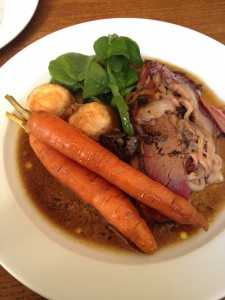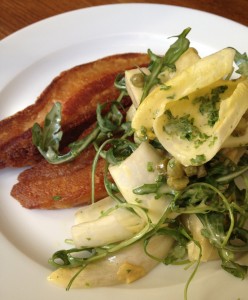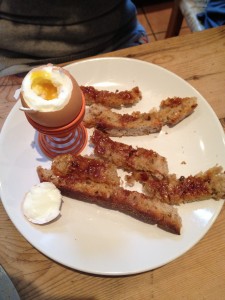Britannia holds her own in the kitchen – finally!
 I made a point of trying to prepare my Chinese friends for our Sunday lunch at St John Bread and Wine. “It’s one of my favourite restaurants, and I think the food is wonderful, but you may find it a bit simple by Chinese standards. The kitchen is incredibly careful (éžå¸¸è®²ç©¶) about the quality of ingredients, and the founding chef was one of the catalysts for the renaissance of British cooking. I’m taking you there because I want to show you some of the best of our local cuisine, but it’s quite meaty. And even if you’re not crazy about the savoury courses, one thing in which they excel is puddings and other sweet things, so you must try them… Etc etc.â€
I made a point of trying to prepare my Chinese friends for our Sunday lunch at St John Bread and Wine. “It’s one of my favourite restaurants, and I think the food is wonderful, but you may find it a bit simple by Chinese standards. The kitchen is incredibly careful (éžå¸¸è®²ç©¶) about the quality of ingredients, and the founding chef was one of the catalysts for the renaissance of British cooking. I’m taking you there because I want to show you some of the best of our local cuisine, but it’s quite meaty. And even if you’re not crazy about the savoury courses, one thing in which they excel is puddings and other sweet things, so you must try them… Etc etc.â€
 Years of dispiriting attempts to introduce Chinese people to Western food have put me on the defensive. In the bad old days, it seemed like a hopeless cause – viz my dinner parties for Sichuanese and Hunanese friends, described in Chapter 4 of ‘Shark’s fin and Sichuan pepper’, and my infamous trip to the French Laundry with three Sichuanese chefs. More recently, I’ve found people increasingly open-minded, and even appreciative of European cooking – but it’s still difficult really to impress a Chinese gourmet. The best Chinese cuisine is so exquisitely balanced that you can eat a 20-course banquet without feeling glutted: it’s designed to be comfortable and healthy as well as delicious: ‘Western food’ can seem heavy in comparison. One restaurateur friend of mine enjoyed eating the rich pastas and game meats of Piedmont, but felt starved of vegetables after a couple of days; while another, though wowed by the culinary pyrotechnics of the Fat Duck, was dismayed at the cloying way all the sweet dishes were served at the end of the meal.
Years of dispiriting attempts to introduce Chinese people to Western food have put me on the defensive. In the bad old days, it seemed like a hopeless cause – viz my dinner parties for Sichuanese and Hunanese friends, described in Chapter 4 of ‘Shark’s fin and Sichuan pepper’, and my infamous trip to the French Laundry with three Sichuanese chefs. More recently, I’ve found people increasingly open-minded, and even appreciative of European cooking – but it’s still difficult really to impress a Chinese gourmet. The best Chinese cuisine is so exquisitely balanced that you can eat a 20-course banquet without feeling glutted: it’s designed to be comfortable and healthy as well as delicious: ‘Western food’ can seem heavy in comparison. One restaurateur friend of mine enjoyed eating the rich pastas and game meats of Piedmont, but felt starved of vegetables after a couple of days; while another, though wowed by the culinary pyrotechnics of the Fat Duck, was dismayed at the cloying way all the sweet dishes were served at the end of the meal.
I have taken Chinese chef friends to St John Bread and Wine before, and although they’ve been mildly approving of the quality of the food, they’ve found it somewhat heavy, and haven’t been able to match my own enthusiasm. Anyway, on Sunday I went there with a couple of young Chinese visitors, wanting to do my duty as an ambassador of British cooking but having modest hopes of the experience. As usual, I wanted to eat almost everything on the menu, but I ordered the following:
Brown shrimp, kohlrabi and chervil
Duck gizzards, dandelion and mustard
Snails, black cabbage and barley
Grilled mackerel and pickled red cabbage
Crispy pig’s cheek and pickled chicory
Salt beef, carrots and dumplings
Poached rhubarb and toasted brioche
Steamed marmalade sponge and Seville custard
I was fully aware of the potential pitfalls. There were rather a lot of raw, crunchy vegetables, which are not a typical Chinese favourite (‘Only barbarians eat salad’). Duck gizzards, which I don’t recall having seen before on a British menu, are a great Chinese delicacy, but the Chinese invariably cut them into criss-cross ‘flowers’ and cook them quickly to preserve their amazingly bouncy, crunchy mouthfeel – would my guests find these British gizzards overcooked, ‘old’ (lao è€) and mealy in texture? Might the mackerel, without a Chinese marinade to remove unpleasant odours, taste rather fishy? And what about the off-tastes Chinese people always complain about in British meat? I wondered whether even the pig’s cheek would hit the spot, because the Chinese are such masters of pork cookery. My selection of dishes might seem too basic for a treat, because, as the Chinese restaurateur said in Turin, ‘in China, we have more than that number of appetisers’. And puddings, however good, don’t tend to be popular with the Chinese, who often find them too sickly-sweet and creamy.
 To my delight, however, these two adored the meal, and found it fascinating, because they’d never had anything like it (like many Chinese residents of this country, they eat mainly Chinese food that they cook themselves, and had – until Sunday – had no positive experience of British food at all). They lapped up the soft-cooked gizzards in their mustardy vinaigrette, and the snails with creamy, soothing barley pepped up by tiny cubes of pork fat, enjoyed the fresh, aromatic mackerel, were amused that the ‘dumplings’ were balls of dough rather than jiaozi-like wrappers with stuffings, exclaimed at the unfamiliar dandelion and pickled walnuts. There were no complaints about ‘fishiness’, and they bestowed on the crispy, melt-in-the-mouth tranche of pig cheek that classic Chinese accolade – fei er bu ni (肥而ä¸è…»ï¼Œâ€˜richly fat without being greasy’). I was so happy. Finally, FINALLY, I managed to impress some discerning Chinese guests. My gastronomic nationalism was satisfied. I gave my country some face!!
To my delight, however, these two adored the meal, and found it fascinating, because they’d never had anything like it (like many Chinese residents of this country, they eat mainly Chinese food that they cook themselves, and had – until Sunday – had no positive experience of British food at all). They lapped up the soft-cooked gizzards in their mustardy vinaigrette, and the snails with creamy, soothing barley pepped up by tiny cubes of pork fat, enjoyed the fresh, aromatic mackerel, were amused that the ‘dumplings’ were balls of dough rather than jiaozi-like wrappers with stuffings, exclaimed at the unfamiliar dandelion and pickled walnuts. There were no complaints about ‘fishiness’, and they bestowed on the crispy, melt-in-the-mouth tranche of pig cheek that classic Chinese accolade – fei er bu ni (肥而ä¸è…»ï¼Œâ€˜richly fat without being greasy’). I was so happy. Finally, FINALLY, I managed to impress some discerning Chinese guests. My gastronomic nationalism was satisfied. I gave my country some face!!
After lunch, we went to the Tower of London, which was a thrill even for me because I haven’t been there since I was a teenager. We saw the Crown Jewels, the glorious views of the Thames and Tower Bridge, the Bloody Tower and the Beefeaters. I had an extraordinary conversation with an old guard about the ghosts he, his colleagues and his parents (old Tower retainers too) had seen while going about their work. The sun shone for most of the day, bright and cold and bracing.
And then we went home and rustled up twice-cooked pork, mapo tofu, Gong Bao chicken, pickled mustard green and beanthread noodle soup and other Sichuan classics for supper.
P.S. One old English favourite which always enthrals foreign guests, in my experience, is boiled eggs with
soldiers for breakfast. Although it’s supposed to be for children, it’s great fun for grown-ups too. This is what we had for breakfast the next day: soldiers spread with butter and marmite (my Chinese visitors agreed that it was reminiscent in its rich, dark umami flavours of soy sauce, and went equally well with eggs), boiled eggs, and then more toast with home-made marmalade and pink crabapple jelly. I remembered to give them the instructions carefully passed on by my mother: when you’ve eaten your boiled egg, turn the shell upside down and smash it so the witches can’t use it as a boat to sail away.



5 Responses to “Britannia holds her own in the kitchen – finally!”
Obviously you got them drunk, and that’s why they were OK with the marmite.
I am not knocking marmite here, it’s just that I see no other way that people from outside the Empire are going to swallow such stuff.
My strategy is always to ask people to think of gastronomic equivalents in their own cultures – then alien foods seem to be easier to take.
Preserved duck eggs – blue cheese
Stinking tofu – smelly ripe cheese
Soy sauce – Marmite
etc
I am Chinese living in New Zealand and when I first came across Marmite as a child, I thought it was soy sauce paste too.
Well done in your quest to convert your Chinese friends. I find that Chinese are more willing to try different cuisines than Western. At least it’s not gizzards, but salad that offends them. I love raw salads and
I love raw meat. I’ve always wondered, is raw meat also reserved for barbarians?
You’re right, Fuchsia, preserved duck eggs and blue cheese share a rich, buttery saltiness, but I know many Chinese who would not consider eating Roquefort or Stilton cheese. I find that roast meats such as tarragon chicken or slow roasted pork belly; duck magrets; and salty dishes such as duck confit are popular with Chinese family and friends. I balance the larger quantities of meat with HUGE platters of veg – steamed, roasted and raw. I think it’s the VARIETY of cooking styles within one meal that appeals to the Chinese palate.
My fav restaurant in the world St John and Sichuan my favourite international cuisine.
Interestingly and a point I made to Fergus once is, it tends to be a myth that the food at St John is heavy. In fact the majority of dishes served tend to be quite low in the carb count, thus making it deceptively easy to plough through quite a few courses. Or indeed the high protein provides a more balanced satiation in my opinion.
Also St John has a magic that is so much beyond the food served and so much more than words could describe. Those that know, know 🙂